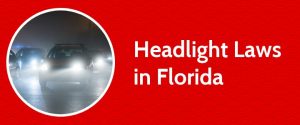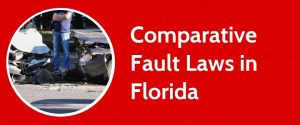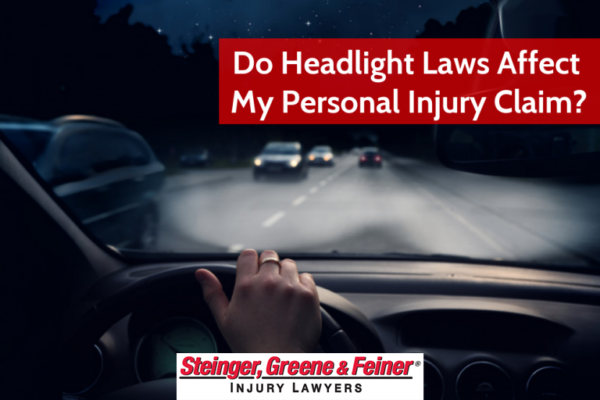When you get in a car accident with a negligent driver, you may not always be 100% blameless for the conditions that led to the collision. Nevertheless, Florida law provides accident victims with the ability to recover their injury-related damages so long as they are not considered to be 50% or more to blame for the accident.
In other words, a driver who makes the mistake of not using their headlights may still be eligible to file a personal injury claim. In some cases, the mistake of not using headlamps may be such a minor part of what truly caused an accident that the factor is disregarded almost completely.
In these cases, Miami personal injury lawyers will attempt to argue on behalf of their plaintiff that the negligent actions of the other drivers involved were so egregious that the accident would have happened regardless of whether the victim had used their headlamps properly.
Of course, these cases can vary dramatically based on the circumstances of the accident and the sentiments of the court involved. Car accident victims in Florida worried about how their headlight use might affect their injury claim can use the following information along with the help of a qualified attorney to form a strategy for their case.

What Does Florida Law Say About Headlight Use?
Florida Statutes 316.217 states that “every vehicle operated upon a highway within this state shall display lighted lamps and illuminating devices […]under the following conditions;”
- “At any time from sunset to sunrise including the twilight hours. Twilight hours shall mean the time between sunset and full night or between full night and sunrise.”
- “During any rain, smoke, or fog.”
Additionally, most traffic courts in the state apply a “windshield wiper” rule, meaning that any time the weather requires you to use your windshield wiper to see, you should have your headlights activated.
Notice, however, that these laws provide some small amount of leeway. For instance, a driver can claim they were not in between sunset and sunrise or during twilight hours if their accident happened near or before the reported times. Even the terms “sunrise” and “sunset” may be vague considering that visibility can vary greatly depending on road conditions and surrounding structures.
Second, the statute only makes mention of vehicles “operated upon a highway.” While it may be implied that all major roads and streets are included in this purview, a driver could contend that they felt their headlights were not needed if they happened to be on a minor road at the time.
Even if a driver is found to be in violation of the above statute, it only counts as a noncriminal traffic infraction and a moving violation. The issuance of a citation to a driver involved in an accident who did not have their headlights on is therefore likely to be seen as less serious if the other driver committed a more egregious violation, such as failing to obey a stop sign.

Vehicle Visibility and “Reasonable Care” of Other Drivers
In addition to the fact that headlight laws have some gray areas, an accident victim can also benefit from the “reasonable person” standard of care used to determine negligence.
According to most legal standards for car accident negligence, someone who is negligent failed to exercise a duty of care as a “reasonable person” would. In the case of a car accident in low light, headlamps are not the only thing that can alert someone to the presence of another vehicle. Tail lamps are often reflective, for instance, even when not illuminated. A cautious driver following a vehicle may therefore notice it even if it does not have its headlamps active.
Additionally, many drivers who strike vehicles not using their headlamps may also be committing a reckless maneuver at the time. They may be speeding, for instance, or crossing over into the opposing lane through curves. They may even be under the influence or driving while distracted.
In these circumstances, a skilled Miami car accident lawyer can argue that the reckless driver would have likely struck the plaintiff regardless of whether the plaintiff had their headlamps active. Or, they may be able to put forth that the victim’s failure to use headlamps was a minor contribution to the accident circumstances.

Comparative Fault Laws in Florida
Even if a car accident injury victim is unable to prove their improper headlight use did not contribute to the causes of an accident, they can still rely on Florida’s comparative fault laws to help them seek a settlement or injury award.
Under a comparative fault system, each person involved in the accident is expected to assume their share of liability for an accident’s damages. So if someone not having their headlights on at night was determined to be 25% of the cause to an accident while another driver’s distraction was given 75% of the blame, the victim will be able to seek up to 75% of their total damages.
Under this system, an individual can seek to recover their medical costs and other damages as long as they aren’t determined to be the majority cause (51%) for an incident.
Working with Miami Personal Injury Lawyers After Your Car Accident
The laws discussed above illustrate why it is so important to fight for your rights as an accident victim regardless of whether you received a citation or if the other parties allege that you were at fault. Florida laws attempt to be fair by allowing the full extent of liability to be determined. Then, accident victims have their chance to recover damages or seek a settlement with third-party insurers.
If you are worried that your own actions could hurt your ability file a personal injury claim, do not hesitate to consult with Miami personal injury lawyers regarding the facts of your case. You can contact Steinger, Greene & Feiner now to schedule your free case evaluation.

